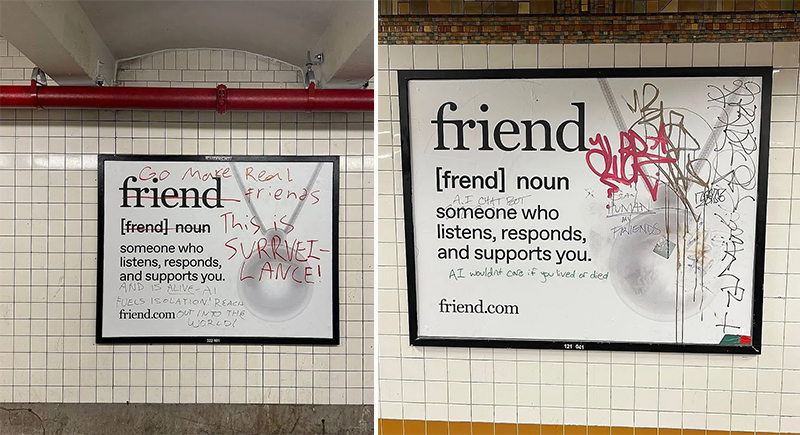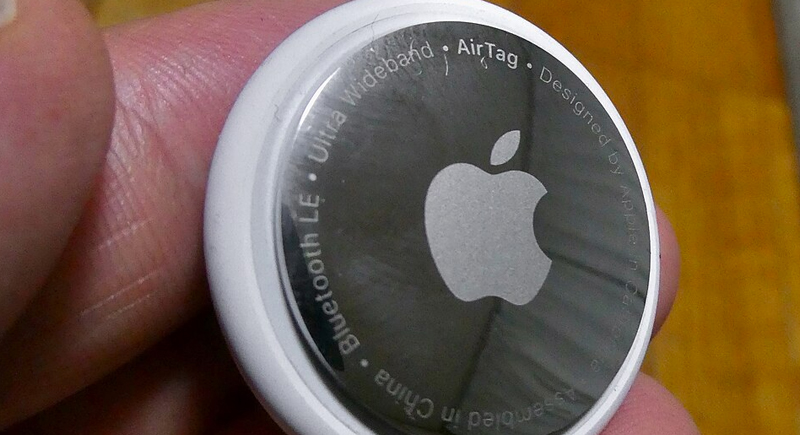This Company Spent a Million Dollars on Ads and Locals Instantly Graffitied Them
Friend, a new AI startup, plastered the New York City subway with more than 13,000 posters introducing its wearable “AI companion.” The campaign reportedly cost over a million dollars and covered nearly every inch of platform space. Within days, locals gave their response by writing right on the ads. What was meant to grab attention ended up becoming a citywide graffiti gallery, with commuters turning the ads into their own commentary.
The Ads Flooded New York’s Subways

Image via Reddit/Better-Turnip-226
On September 25, 2025, more than 11,000 car cards, 1,000 platform posters, and 130 large street panels promoting Friend appeared across all five boroughs. Each one carried short black-on-white promises like “I’ll never leave dirty dishes in the sink” or “I’ll binge the entire series with you.”
The lines were simple, oddly personal, and signed only “Friend.” They weren’t quotes from people—they were selling points for a $129 pendant that acts as a digital companion. The device uses an always-on microphone to listen to its wearer, respond through AI, and message them via an app.
The company behind it, Friend, was founded by 22-year-old Avi Schiffmann, a Harvard dropout who raised $7 million in venture capital. Schiffmann described the campaign as “buying mindshare,” saying the goal was to grab attention and push his brand into the cultural conversation.
The Public Responded with Graffiti and Criticism
Within days of the launch, the ads were covered in graffiti. New Yorkers ended up writing detailed rejections of the entire concept. Messages like “AI is not your friend,” “Surveillance capitalism,” and “Human connection is sacred” appeared in thick marker ink. At several stations, phrases like “AI wouldn’t care if you lived or died” took over the space left intentionally blank in the design.
Schiffmann later admitted the white space was intentional, and he had predicted that people would fill it in. He described it as “rage bait.”
Public figures and organizations also joined the response. The ACLU issued a warning that devices like this could easily be used to gather and misuse private data. Online, comedians, writers, and users posted reactions ranging from satire to serious concern. Across platforms, the product quickly became associated with loneliness, emotional manipulation, and corporate overreach rather than innovation or companionship.
The Product’s Function Raised Privacy Concerns

Image via Wikimedia Commons/KKPCW
The Friend device itself resembles an AirTag on a necklace and is always listening. It records sound from its surroundings, processes it using artificial intelligence, and texts a personalized response to the user’s phone. Schiffmann has said he talks to it more than to real people. For many critics, this behavior didn’t demonstrate convenience but revealed dependence.
Tech reviewers who tested the product found that it performed poorly in public settings. According to The Verge and Wired, the device often failed to hear properly, struggled with noisy environments, and created social discomfort. One reporter described how strangers reacted negatively to the visible pendant. At the same time, others found the responses repetitive, shallow, and emotionally hollow.
Instead of feeling like a conversation, the device reflected back basic observations and offered generic follow-up prompts. These issues weren’t just technical failures; they exposed the difficulty of building emotional technology that people trust or want around them in public.